Specific characteristics of attributional style in paranoid patiens compared to depressed patients and non-clinical controls
DOI:
https://doi.org/10.19090/pp.2008.1-2.37-56Keywords:
attributions, paranoid disorders, depression, cognitive biasAbstract
The hypothesis about the paranoid attributional style was tested by comparing the groups of depressive, paranoid and normal subjects. Patients with depressive (N=58) and paranoid disorders (N=30) were compared to normal controls (N=30). The groups were matched for age. An instrument based on the Attributional Style Questionnaire was used to measure the dimensions of attributional style. The data were subjected to a multivariate analysis of covariance, with groups as an independent variable, the dimensions of attribution as dependent variables, and the importance of situations as a covariate. The results showed that the paranoid patients tended to attribute success to internalizing causes, and to attribute negative situations to externalizing causes to a greater extent than the depressed and control groups. Also, their attributions were more global compared to the other groups. In some situations, the importance of situations was a significant element of attributioning, even more significant than the kind of disorder. In attributing negative achievement situations, the paranoid patients showed the largest attributional bias. All three groups tended to show an attributional bias for negative social situations, suggesting that future attributional research need to control for the situation types. The most important implication of this study is that in treatment of paranoid patients a greater emphases should be placed on self-respect enhancement, as a way of changing their attributional biases.Downloads
Published
18.03.2008
How to Cite
Cvejić-Starčević, N., & Novović, Z. (2008). Specific characteristics of attributional style in paranoid patiens compared to depressed patients and non-clinical controls. Primenjena Psihologija, 1(1-2), 37–56. https://doi.org/10.19090/pp.2008.1-2.37-56
Issue
Section
Regular issues







